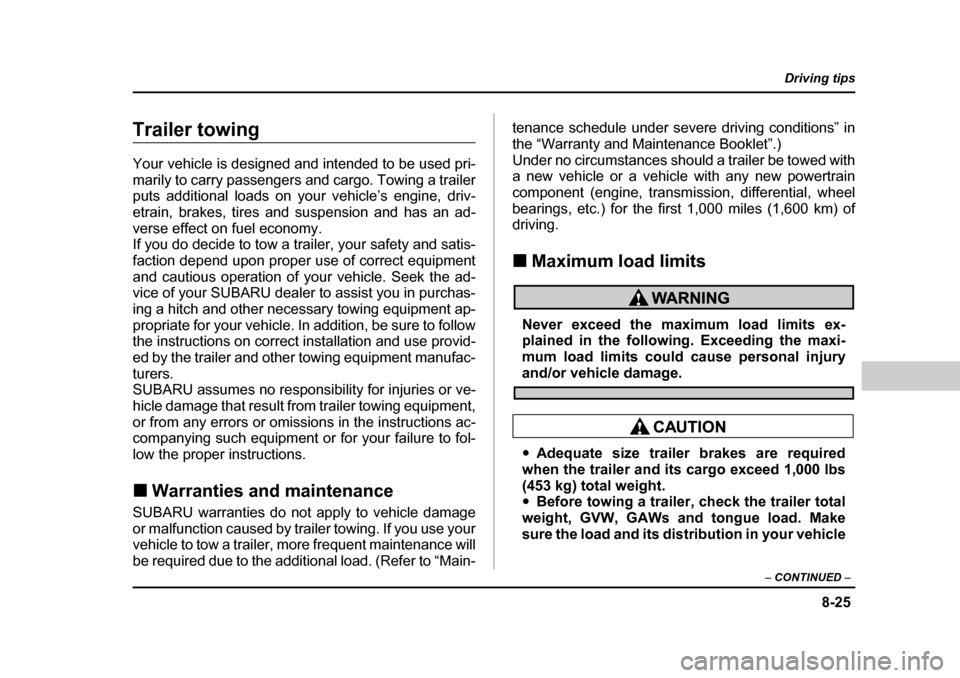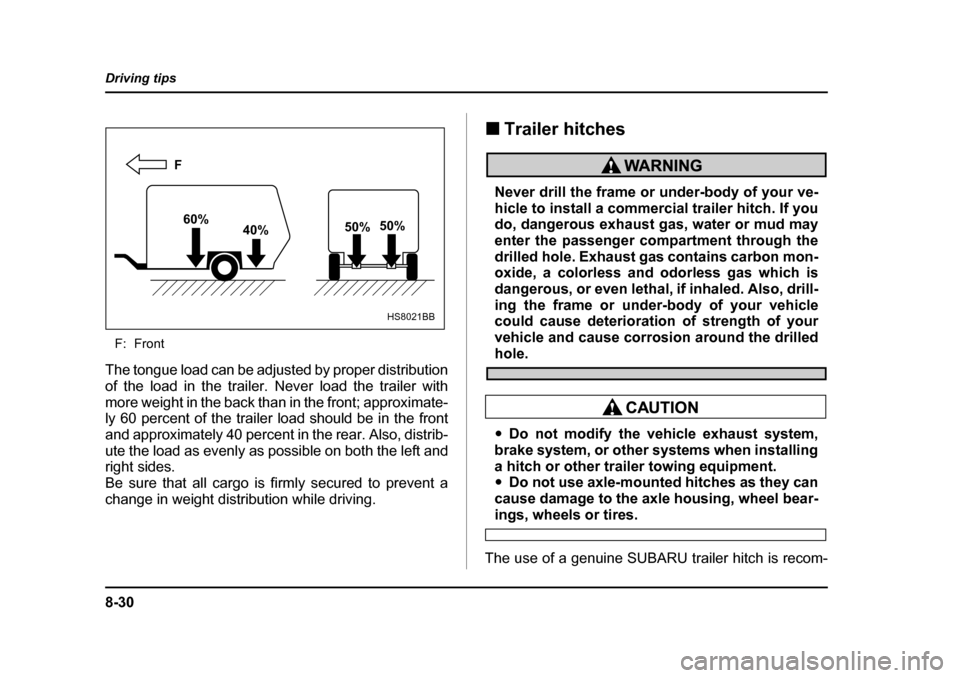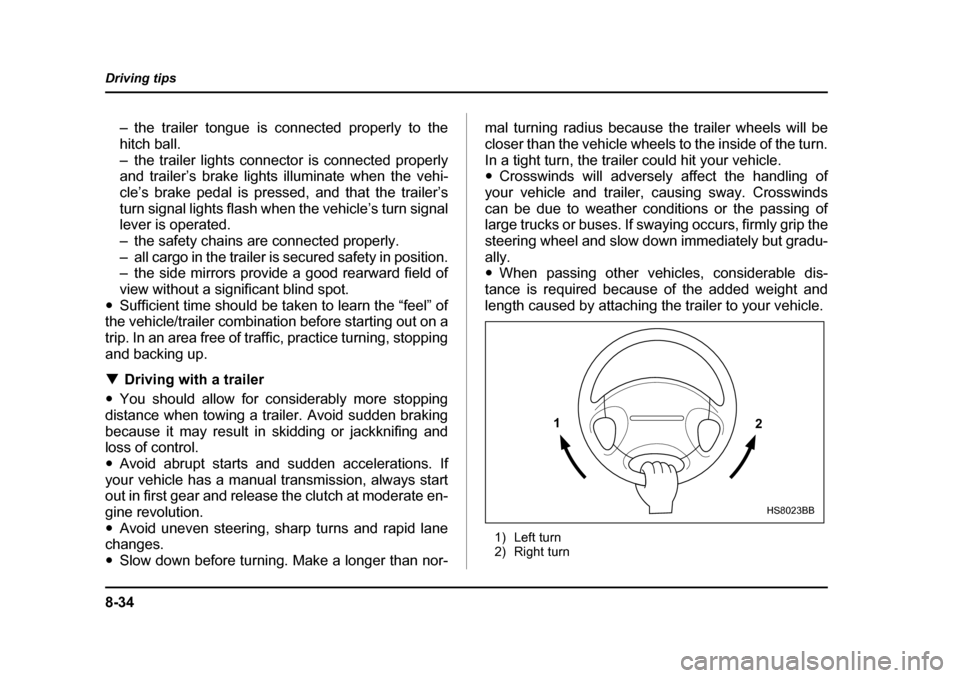Page 318 of 487

8-25
Driving tips
– CONTINUED –
Trailer towing
Your vehicle is designed and intended to be used pri-
marily to carry passengers and cargo. Towing a trailer
puts additional loads on your vehicle’s engine, driv-
etrain, brakes, tires and suspension and has an ad-
verse effect on fuel economy.
If you do decide to tow a trailer, your safety and satis-
faction depend upon proper use of correct equipment
and cautious operation of yo ur vehicle. Seek the ad-
vice of your SUBARU dealer to assist you in purchas-
ing a hitch and other necessary towing equipment ap-
propriate for your vehicle. In addition, be sure to follow
the instructions on correct installation and use provid-
ed by the trailer and other towing equipment manufac-
turers.
SUBARU assumes no responsibi lity for injuries or ve-
hicle damage that result from trailer towing equipment,
or from any errors or omissions in the instructions ac-
companying such equipment or for your failure to fol-
low the proper instructions. �„ Warranties and maintenance
SUBARU warranties do not apply to vehicle damage
or malfunction caused by trailer towing. If you use your
vehicle to tow a trailer, more frequent maintenance will
be required due to the additional load. (Refer to “Main- tenance schedule under severe driving conditions” in
the “Warranty and Maintenance Booklet”.)
Under no circumstances should a trailer be towed with
a new vehicle or a vehicle with any new powertrain
component (engine, transmis
sion, differential, wheel
bearings, etc.) for the first 1,000 miles (1,600 km) of
driving. �„ Maximum load limits
Never exceed the maximum load limits ex-
plained in the following. Exceeding the maxi-
mum load limits could cause personal injury
and/or vehicle damage.
�yAdequate size trailer brakes are required
when the trailer and its cargo exceed 1,000 lbs
(453 kg) total weight. �y Before towing a tr ailer, check the trailer total
weight, GVW, GAWs and tongue load. Make
sure the load and its dist ribution in your vehicle
Page 322 of 487
8-29
Driving tips
– CONTINUED –
�TTongue load
Tongue load
If the trailer is loaded with more weight in the
back of trailer’s axle than in the front, the load
is taken off the rear axle of the towing vehicle.
This may cause the rear wheels to skid, espe-
cially during braking or when vehicle speed is
reduced during cornering, resulting in over-
steer, spin out and/or jackknifing. Ensure that the trailer tongue load is from 8 to 11 per-
cent of the total trailer weight and does not exceed the
maximum value of 200 lbs (90 kg).
1) Jack
2) Bathroom scale
The tongue load can be weighed with a bathroom
scale as shown in the following illustration. When
weighing the tongue load, be sure to position the tow-
ing coupler at the height at which it would be during ac-
tual towing, using a jack as shown.
HS8019AA
2
1
UB8040BB
Page 323 of 487

8-30
Driving tips
F: Front
The tongue load can be adjusted by proper distribution
of the load in the trailer. Never load the trailer with
more weight in the back than in the front; approximate-
ly 60 percent of the trailer load should be in the front
and approximately 40 percent in the rear. Also, distrib-
ute the load as evenly as possible on both the left and
right sides.
Be sure that all cargo is firmly secured to prevent a
change in weight distribution while driving. �„
Trailer hitches
Never drill the frame or under-body of your ve-
hicle to install a commercial trailer hitch. If you
do, dangerous exhaust gas, water or mud may
enter the passenger compartment through the
drilled hole. Exhaust gas contains carbon mon-
oxide, a colorless and odorless gas which is
dangerous, or even lethal, if inhaled. Also, drill-
ing the frame or under-body of your vehicle
could cause deterioration of strength of your
vehicle and cause corrosion around the drilled
hole.
�yDo not modify the vehicle exhaust system,
brake system, or other systems when installing
a hitch or other trailer towing equipment. �y Do not use axle-mounted hitches as they can
cause damage to the axle housing, wheel bear-
ings, wheels or tires.
The use of a genuine SUBARU trailer hitch is recom-
F
60% 40% 50%
50%
HS8021BB
Page 327 of 487

8-34
Driving tips
– the trailer tongue is connected properly to the
hitch ball.
– the trailer lights connector is connected properly
and trailer’s brake lights illuminate when the vehi-
cle’s brake pedal is pressed, and that the trailer’s
turn signal lights flash when the vehicle’s turn signal
lever is operated.
– the safety chains are connected properly.
– all cargo in the trailer is secured safety in position.
– the side mirrors provide a good rearward field of
view without a significant blind spot.
�y Sufficient time should be taken to learn the “feel” of
the vehicle/trailer combination before starting out on a
trip. In an area free of traffic, practice turning, stopping
and backing up. �T Driving with a trailer
�y You should allow for considerably more stopping
distance when towing a trailer. Avoid sudden braking
because it may result in skidding or jackknifing and
loss of control. �y Avoid abrupt starts and sudden accelerations. If
your vehicle has a manual transmission, always start
out in first gear and release the clutch at moderate en-
gine revolution.�y Avoid uneven steering, sharp turns and rapid lane
changes.�y Slow down before turning. Make a longer than nor- mal turning radius because the trailer wheels will be
closer than the vehicle wheels to the inside of the turn.
In a tight turn, the trailer could hit your vehicle. �y
Crosswinds will adversely affect the handling of
your vehicle and trailer, causing sway. Crosswinds
can be due to weather conditions or the passing of large trucks or buses. If sway ing occurs, firmly grip the
steering wheel and slow down immediately but gradu-
ally. �y When passing other vehicles, considerable dis-
tance is required because of the added weight and
length caused by attaching the trailer to your vehicle.
1) Left turn
2) Right turn
1 2
HS8023BB
Page 328 of 487

8-35
Driving tips
– CONTINUED –
�yBacking up with a trailer is difficult and takes prac-
tice. When backing up with a trailer, never accelerate
or steer rapidly. When turning back, grip the bottom of
the steering wheel with one hand and turn it to the left
for a left turn, and turn it to the right for a right turn.
�y If the ABS warning li ght illuminates while the vehicle
is in motion, stop towing the trailer and have repairs
performed immediately by the nearest SUBARU deal-er. �T Driving on grades
�y Before going down a steep hill, slow down and shift
into lower gear (if necessary, use 1st gear) in order to
utilize the engine braking ef fect and prevent overheat-
ing of your vehicle’s brakes. Do not make sudden
downshifts.�y When driving uphill in hot weather, the air condition-
er may turn off automatically to protect the engine from
overheating.�y When driving uphill in hot weather, pay attention to
the water temperature gauge pointer (for all vehicles)
and AT OIL TEMP warning light (for AT vehicles) since
the engine and transmission are relatively prone to
overheating under these conditions. If the water tem-
perature gauge pointer approaches the OVERHEAT
zone or the AT OIL TEMP warning light illuminates,
immediately switch off the ai r conditioner and stop the
vehicle at the nearest safe place. Refer to the “Engine overheating” section in chapter 9, and “Warning and indicator lights” se
ction in chapter 3.
NOTE (Turbo models only)
In a vehicle that has an automatic transmission,
the engine is less likely to overheat with the “D”
range selected than it is with the manual mode se-
lected. �y If your vehicle has an autom atic transmission, avoid
using the accelerator pedal to stay stationary on an
uphill slope instead of using the parking brake or foot
brake. That may cause the transmission fluid to over-
heat. �y Non-turbo models only: If your vehicle has an auto-
matic transmission, place the selector lever as follows:
Uphill slopes: “D” position
Downhill slopes: A low-speed gear position to use en-
gine braking �T Parking on a grade
Always block the wheels under both vehicle and trailer
when parking. Apply the parking brake firmly. You
should not park on a hill or slope. But if parking on a
hill or slope cannot be avoided, you should take the
following steps:
1. Apply the brakes and hold the pedal down.
2. Have someone place wheel blocks under both the
Page 329 of 487
8-36
Driving tips
vehicle and trailer wheels.
3. When the wheel blocks are in place, release theregular brakes slowly until
the blocks absorb the load.
4. Apply the regular brakes and then apply the park-
ing brake; slowly release the regular brakes.
5. Shift into 1st or reverse gear (manual transmission)
or “P” (automatic transmission) and shut off the en-
gine.
Page 330 of 487

9-1
9
In case of emergency
If you park your vehicle in an emergency .. 9-2
Jack and tools ............................................... 9-3 Location of jack and tools ............................... 9-3
Removing jack and tool bag ............................ 9-3
Restoring jack and tools .................................. 9-5
Spare tire ....................................................... 9-7 Removing the spare tire ................................... 9-7
Re-storage of spare tire ................................... 9-9
Temporary spare tire .................................... 9-10 Using the temporary spare tire ........................ 9-10
Flat tires ......................................................... 9-12 Changing a flat tire ........................................... 9-12
Jump starting ................................................ 9-18 How to jump start ............................................. 9-19
Engine overheating ....................................... 9-21 If steam is coming from the engine compartment .................................................. 9-21
If no steam is coming from the engine compartment .................................................. 9-21
Towing ........................................................... 9-22 Towing and tie-down hooks ............................ 9-23
Using a flat-bed truck ....................................... 9-27
Towing with all wheels on the ground ............ 9-27
Page 332 of 487
9-3
In case of emergency
– CONTINUED –
Jack and tools
The jack supplied with the vehicle is designed only for
changing a tire.
Before using the jack, see the “Flat tires” section in this
chapter for instructions and precautions. �„Location of jack and tools
The jack and tool bag are located in the left side rear
quarter pocket at the back si de of the rear seatback. A wheel nut wrench, jack drive tube, tire holding rod,
tire holding retainer, screwdriver and two belts are in-
cluded in the tool bag. �„
Removing jack and tool bag
Before folding down the seatback, check that
there is nothing in the seatback pocket. If there
is something in the pocket, it could be damaged
or cause damage to the seatback and rear cen-
ter console when the seatback is folded.
UB9091BA
900276